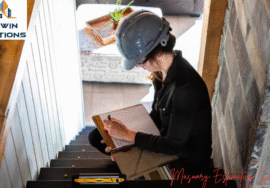Concrete masonry blocks come in different sizes to suit various construction needs. This in-depth article from Bidwin Solutions USA details dimensional specifications for metric and imperial concrete blocks commonly used in foundations, retaining walls, slab on grade and medium-rise buildings.
Concrete masonry blocks are one of the most widely used building materials in construction. Their versatility stems from coming in an array of standard sizes that suit different project applications.
At Bidwin Solutions USA, we’ve compiled an exhaustive guide to the dimensional specifications of these important building units. Within this reference, you will find comprehensively outlined block sizes for both metric and imperial units.
We provide detailed dimensions for small blocks used in slab-on-grade construction all the way up to larger blocks well-suited to multi-story walls. Learning the characteristics of these various concrete masonry blocks will help you immensely in material selection for foundations, walls, pavestones and more.
Standard Block Sizes
There are several standard sizes of concrete masonry blocks commonly used in construction. For smaller applications like slab-on-grade, the nominal block size is 8x8x16 inches (200x200x400mm).

These compact units are well-suited to setting the foundation and preparing a level base before pouring the slab. Larger blocks in the dimensions of 8x8x24 inches (200x200x600mm) are frequently employed for basement walls, short landscaping walls and other low-rise structures.
One of the most ubiquitous block sizes is the standard 8x8x16 inches (200x200x400mm). This versatile unit supports a wide variety of wall construction needs from 1-2 story homes to commercial buildings.
The dimensions allow for fast assembly of walls up to 20 feet tall with running bond patterns. Contractors also regularly use larger 12x8x16 inch (300x200x400mm) blocks for reinforced stem walls in 2-3 story construction. Their extra width lends robustness and simplifies bonding corners and junctions.
Specialty Blocks
Beyond the standard rectangular blocks, concrete masonry units also come in specialized shapes to serve unique construction needs. Corner blocks are available to build angled walls more easily.
With an L-shaped cross-section like 8x8x16x16 inches (200x200x400x400mm), they eliminate cutting and help tie perpendicularly-set blocks together at angles.
Split-face and ground-face blocks are textured for an attractive stone appearance in outdoor applications.

Utility blocks have precast openings to ease running pipes and electrical wiring. Common configurations include 4x8x16 inches (100x200x400mm) blocks with a 4-inch (100mm) hole spaced vertically up a wall.
Other hollow-core concrete blocks like 4x8x16 inches (100x200x400mm) have a hollow center for reinforced pillars or lightweight construction.
Their cores lower weight and material usage compared to solid blocks. Precast concrete caps and sills in matching dimensions provide a finished look for wall tops and bases.
Benefits of Using CMU Blocks
Concrete masonry blocks offer numerous advantages that have made them a contractor-preferred building material. They are durable and provide good insulation as well as fire resistance.
Being load-bearing, blocks can support upper floors and roofing. Their hollow-core design means lightweight blocks that are easy to cut and install. This speeds up wall construction compared to poured concrete. As a modular unit, blocks simplify estimating, planning and bonding various wall configurations.
At
Bidwin Solutions USA, we have extensive experience with CMU building construction. We can attest that blocks minimize jobsite waste and are less weather-dependent than other materials.

Their dimensional precision and interlocking design foster quick accurate stacking. Pre-manufactured blocks provide consistent quality walls.
Users have a wide profile to choose from, including split-face surfaces, integral colors and surface treatments. Versatility in applications from short spans to multi-floor structures make blocks a cost-effective building material.
Selecting the Right Dimensions for Your Project
Proper selection of block dimensions is imperative for construction efficiency and design compatibility. At Bidwin Solutions USA, our experts consider several factors such as wall height, structural requirements and bonding patterns needed.
For load-bearing walls under 8 feet, smaller 8x8x16 inch blocks often fit well. Taller walls may leverage bigger blocks like 12x8x16 inches for their reinforcement attributes.
Block sizes must coincide with floor joist and beam spacing above. Utility block dimensions also depend on planned pipe runs.

Compatibility with other materials is likewise important. Face brick veneers require joint spacing that corresponds to block coursing. Precast sills, caps and accessories should match up as well for neat installation.
Consulting an engineer is wise for sound structural walls. Proper seismic design may necessitate solid grouted smaller blocks instead of hollow larger blocks too.
With Bidwin Solutions USA’s guidance, you can pick the right concrete masonry unit dimensions the first time to avoid rework and ensure an efficient build.
Dimensional Variations and Their Uses
While the standard block sizes are most common, some dimensional variations exist to serve particular construction needs. Metric blocks are increasing in popularity in parts of North America.
Examples include 190x90x190mm and 190x190x390mm sizes. Taller blocks have their place too – 200x200x600mm or 200x200x1000mm sizes suit very high-rise walls.
Modular block dimensions correlate with 4 foot, 8 foot and 12 foot wall modules for commercial building pre-planning. Architectural split-face blocks come cut in decorative shapes.

Paving stones cut from 8×16 inch (200x400mm) segmented blocks create durable driveways and walkways. Hydraulic-press manufactured blocks let contractors construct accurate radius walls for circular foundations, arches, or dome structures.
Hollow full-height blocks like 305x152x426mm help reduce costs on sound barrier construction along highways. When unique structures require non-standard shapes, block manufacturers can often meet custom sizing needs too. At Bidwin Solutions USA, our construction experts ensure the right dimensional variations are specified for project goals.
Last Words
We hope this guide has provided valuable insight into the standard sizing and applications of concrete masonry blocks. As the foremost construction material for many projects, understanding CMU block dimensions is key to accurate planning and estimation.
At Bidwin Solutions USA, our team of specialists remains available to answer any other questions regarding unit selection, laying patterns or structural design with blocks.
Whether reviewing plans or visiting job sites, we are always eager to consult on effective use of these versatile building units.
In considering concrete masonry blocks for your next project, keep in mind both their inherent strengths and the benefits of proper dimensional coordination.
Relying on an experienced resource like Bidwin Solutions USA can help transform the mundane exercise of material choosing into optimal construction execution.
Our focus on CMU blocks dimensions serves building professionals and project success alike. Feel free to contact us to envision how these simple yet stalwart blocks can form the foundation for your vision.

 These compact units are well-suited to setting the foundation and preparing a level base before pouring the slab. Larger blocks in the dimensions of 8x8x24 inches (200x200x600mm) are frequently employed for basement walls, short landscaping walls and other low-rise structures.
One of the most ubiquitous block sizes is the standard 8x8x16 inches (200x200x400mm). This versatile unit supports a wide variety of wall construction needs from 1-2 story homes to commercial buildings.
The dimensions allow for fast assembly of walls up to 20 feet tall with running bond patterns. Contractors also regularly use larger 12x8x16 inch (300x200x400mm) blocks for reinforced stem walls in 2-3 story construction. Their extra width lends robustness and simplifies bonding corners and junctions.
These compact units are well-suited to setting the foundation and preparing a level base before pouring the slab. Larger blocks in the dimensions of 8x8x24 inches (200x200x600mm) are frequently employed for basement walls, short landscaping walls and other low-rise structures.
One of the most ubiquitous block sizes is the standard 8x8x16 inches (200x200x400mm). This versatile unit supports a wide variety of wall construction needs from 1-2 story homes to commercial buildings.
The dimensions allow for fast assembly of walls up to 20 feet tall with running bond patterns. Contractors also regularly use larger 12x8x16 inch (300x200x400mm) blocks for reinforced stem walls in 2-3 story construction. Their extra width lends robustness and simplifies bonding corners and junctions.
 Utility blocks have precast openings to ease running pipes and electrical wiring. Common configurations include 4x8x16 inches (100x200x400mm) blocks with a 4-inch (100mm) hole spaced vertically up a wall.
Other hollow-core concrete blocks like 4x8x16 inches (100x200x400mm) have a hollow center for reinforced pillars or lightweight construction.
Their cores lower weight and material usage compared to solid blocks. Precast concrete caps and sills in matching dimensions provide a finished look for wall tops and bases.
Utility blocks have precast openings to ease running pipes and electrical wiring. Common configurations include 4x8x16 inches (100x200x400mm) blocks with a 4-inch (100mm) hole spaced vertically up a wall.
Other hollow-core concrete blocks like 4x8x16 inches (100x200x400mm) have a hollow center for reinforced pillars or lightweight construction.
Their cores lower weight and material usage compared to solid blocks. Precast concrete caps and sills in matching dimensions provide a finished look for wall tops and bases.
 Their dimensional precision and interlocking design foster quick accurate stacking. Pre-manufactured blocks provide consistent quality walls.
Users have a wide profile to choose from, including split-face surfaces, integral colors and surface treatments. Versatility in applications from short spans to multi-floor structures make blocks a cost-effective building material.
Their dimensional precision and interlocking design foster quick accurate stacking. Pre-manufactured blocks provide consistent quality walls.
Users have a wide profile to choose from, including split-face surfaces, integral colors and surface treatments. Versatility in applications from short spans to multi-floor structures make blocks a cost-effective building material.
 Compatibility with other materials is likewise important. Face brick veneers require joint spacing that corresponds to block coursing. Precast sills, caps and accessories should match up as well for neat installation.
Consulting an engineer is wise for sound structural walls. Proper seismic design may necessitate solid grouted smaller blocks instead of hollow larger blocks too.
With Bidwin Solutions USA’s guidance, you can pick the right concrete masonry unit dimensions the first time to avoid rework and ensure an efficient build.
Compatibility with other materials is likewise important. Face brick veneers require joint spacing that corresponds to block coursing. Precast sills, caps and accessories should match up as well for neat installation.
Consulting an engineer is wise for sound structural walls. Proper seismic design may necessitate solid grouted smaller blocks instead of hollow larger blocks too.
With Bidwin Solutions USA’s guidance, you can pick the right concrete masonry unit dimensions the first time to avoid rework and ensure an efficient build.
 Paving stones cut from 8×16 inch (200x400mm) segmented blocks create durable driveways and walkways. Hydraulic-press manufactured blocks let contractors construct accurate radius walls for circular foundations, arches, or dome structures.
Hollow full-height blocks like 305x152x426mm help reduce costs on sound barrier construction along highways. When unique structures require non-standard shapes, block manufacturers can often meet custom sizing needs too. At Bidwin Solutions USA, our construction experts ensure the right dimensional variations are specified for project goals.
Paving stones cut from 8×16 inch (200x400mm) segmented blocks create durable driveways and walkways. Hydraulic-press manufactured blocks let contractors construct accurate radius walls for circular foundations, arches, or dome structures.
Hollow full-height blocks like 305x152x426mm help reduce costs on sound barrier construction along highways. When unique structures require non-standard shapes, block manufacturers can often meet custom sizing needs too. At Bidwin Solutions USA, our construction experts ensure the right dimensional variations are specified for project goals.









